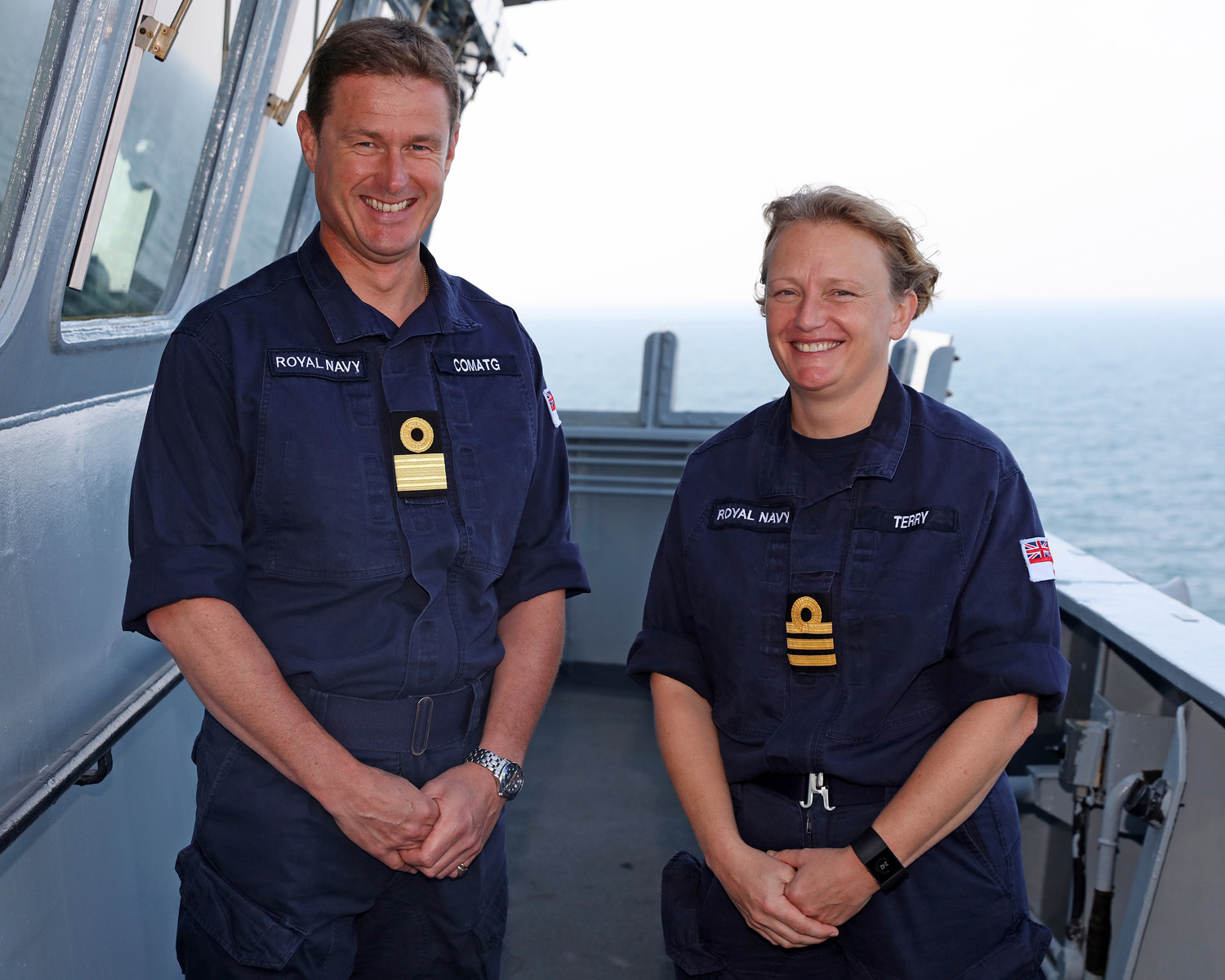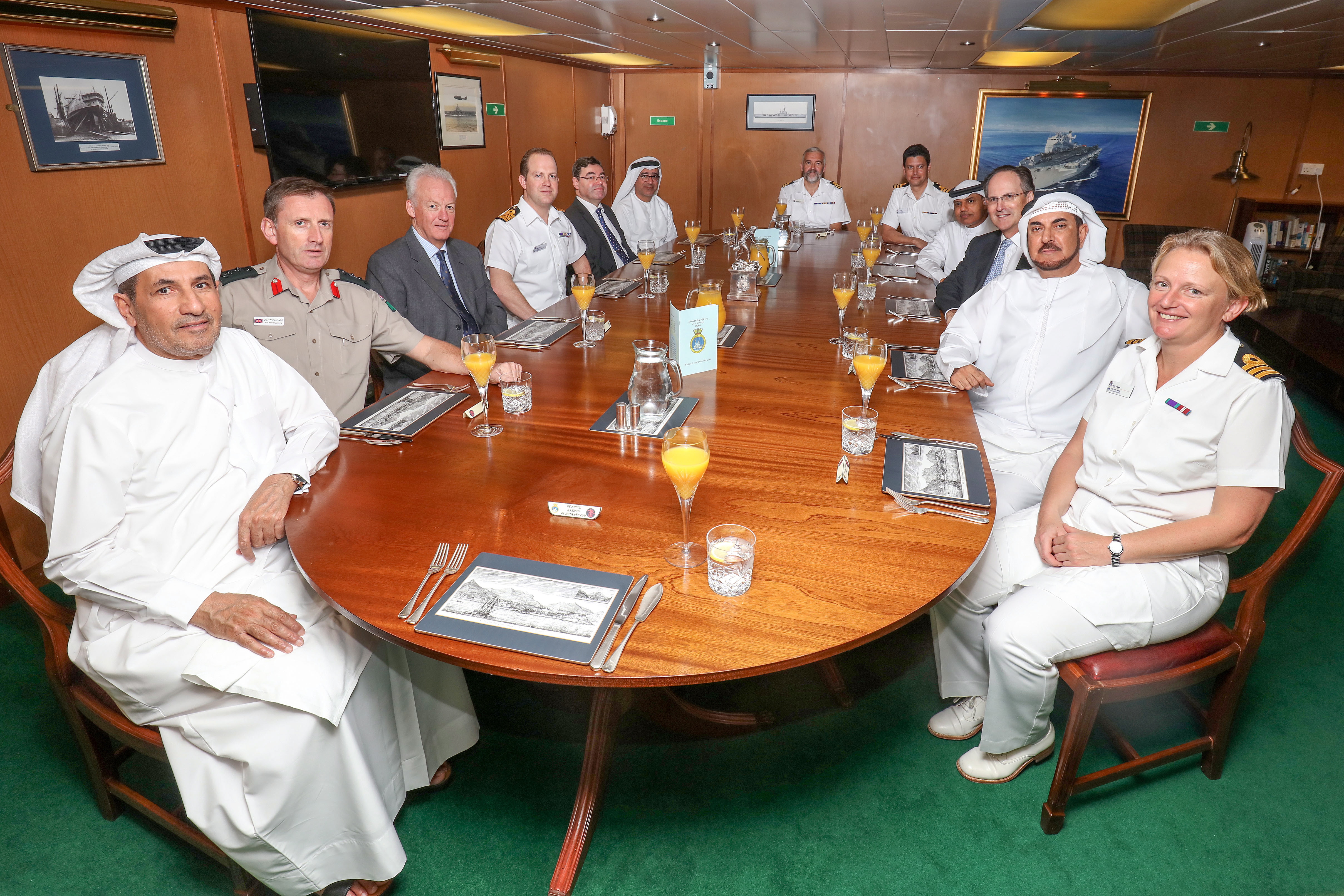


A "proud" Jersey girl who became the Royal Navy's highest ranking female officer has opened up about the key lessons she has taken from her impressive career so far – including those learnt the hard way.
Last year, former Jersey College for Girls student Jude Terry became the first female flag rank officer in the Royal Navy when she was promoted to Rear Admiral at a ceremony aboard Lord Nelson's flagship HMS Victory at Portsmouth naval base.
Now responsible for more than 40,000 regular and reservist sailors, Royal Marines, Royal Fleet Auxiliary staff and civil servants, along with more than 30,000 cadets, the Rear Admiral has a wealth of management experience.
Her promotion was the latest step in a career that has seen her occupy 18 different Jobs in 26 years’ service since she joined up having graduated from Dundee University with a degree in anatomical sciences.
Nothing was lacking so far as motivation was concerned.

Pictured: Rear Admiral Jude Terry, the Royal Navy's highest-ranking female officer, shared leadership lessons from her career (Lee Blease).
Her father – also in the Navy – died when she was just 12, leaving her mother a single parent with the responsibility of bringing up a young family. It had an impact on her, and started the journey of shaping her into the leader she is today.
While, in the Rear Admiral’s own words, “there is no right answer to leadership”, there are some key lessons to learn – some of which she picked up the hard way, as she revealed during a recent Leadership Jersey event…
Get to know yourself…
My dad being in the Navy probably contributed to me. And my dad died when I was 12 was very definitely a contributing factor to who I am and how I am. I was raised by a single mum. And I had one amazing sister.
My mum was pretty good at telling me I could be anything to I wanted to be until I was 16 when I told her I wanted to join the Navy and she told me I couldn’t do that. Then I went to university and, at 24, when I still wanted to join, she just gave up.
That’s my story – Jersey made me, my family made me, and the Navy has let me be who I am. One of my observations about leaders and managers: you need to know your people and you need to know yourself.
If you know what makes you smile, if you know what makes you cross, if you know you really are true to and what your authentic self is, then you can then you can work through almost anything. That is exactly the same in business.
…and your team
You have to remember that you become more exposed, the more you’re leading – ‘Yes, sir.’ ‘No, sir.’ It’s mainly ‘Sirs’ in my world – but actually, it's the people below you who will shape you, who will follow you, who will do what you want them to – or they’ll consent and evade.
...It's all about developing a team. I found that the hardest thing since I got to this job, because in my brain, my vision is really clear. What I want to do is really clear – make us a better employer, more inclusive, I want to deliver better operational capability to frontline – but developing the team means you don't just tell them to do it. It's one of the most frustrating things.

Pictured: June Terry highlighted the importance of self-awareness, humility, and seeking help (Rob Currie).
The other thing is feedback: be prepared to take feedback and ask for some feedback from some people who you know. That's a really brave place to be, but it is actually the only way we will get better or at least know what's annoying, and then how to work out how to manage it, even if you even if you don't want to stop it.
Always admit to your mistakes… A lesson she learnt during her first job as what she called a “grown-up or nearly” was at HMS Neptune, the Navy’s base at Faslane on the River Clyde, home to the submarines that provide Britain’s trident nuclear deterrent…
I was in charge of people and pay. I turned up on day one and I had a team of 40 people working for me. Somebody said to me, ‘Oh, you're the new Wren officer.’ And I said, and I quote, ‘I'm not a bloody Wren – I joined the Navy to go to sea.’
Imagine when I turned round and realised that 36 of the 40 people who worked for me had joined as Wrens. For me it was really obvious – I was a naval officer and Wrens ceased to exist in 1993. What I’d forgotten to do was to put myself into other people’s shoes and realise how that might feel. I went back out and apologised to everybody. Lesson number one: never assume that everyone thinks the same as you do and be prepared to be humble when you get it wrong.
The more senior you get, the more you should be putting your hand up and saying you don’t know. Or you’re not quite sure or could someone give you some feedback. And ask for some feedback from some people you don’t like you. It’s the only way you will get better, or at least know what’s annoying them, and how to manage it even if you can’t stop it.
Don’t hesitate to reach out for help when you need it
I was privileged to be promoted to captain in 2018 – and I was stunned. I never thought I'd get that far, thinking about the gobby 24-year-old who was never quite sure she was going to make it.
I had the privilege to be responsible in a joint operational headquarters – a team of people who did logistics, communications, money, personnel. It was the job I felt most qualified for in my life. And it was the only job I've ever been bullied in.
We like our hierarchical structures in the Navy, in defence, really. You had a two-star headquarters – that was the ‘dad’ – and one-star headquarters – they were the children.

Pictured: Commodore Terry during her time as a Captain, pictured alongside Commodore Andrew Burns.
The children hadn't been used to having a ‘big dad’, and they didn't like it very much. One individuals decided he really didn't like me, as a captain in the Navy, telling him what to do. The odd thing is that in the army they’re used to that. But for that individual he couldn’t deal with it.
Why is that a lesson in leadership? One, I was determined, I didn't need anyone’s help. I can sort this. And so I didn't look after myself. It got to a point where my team would come back from briefings and say, ‘He's just been really bad mouthing you.’… My boss kept saying, ‘Do you want me to do something?’ No. I don't want you to do something. It's nothing to do with being a woman, just I can look after myself.
Then, I went on a Windsor Leadership Trust Programme, and I hadn’t realised quite how much it had affected me. After that, I went back to work and said, ‘I’m done. I’m done with turning up and him cancelling my meetings, I’m done with him talking over me. You, my boss, can now do what you probably should have done six months ago, but I didn’t let you or was it because I’m the only woman in your team, and you didn’t quite want to patronise me? And actually, we need to talk about that.’
You can’t always wait for 100% certainty
Yes, the military has to be prepared for China, for Russia, for the Middle East – for whatever comes next – but so do all of you because you are either responsible for people and their families, or you are responsible for yourself and your family, and therefore you need to think about volatility.
…You can’t wait until you have 100%. The higher up you go, you need to make a decision.

Pictured: Jude Terry attending a dinner for VIPS aboard the HMS Ocean in 2016.
My favourite saying on that is: ‘Don’t be a flat squirrel.’ Squirrels dither, they can’t decide when to cross. There is only one guaranteed thing – they are going to be squashed. You are better to back yourself with the evidence you’ve got, with your gut instinct, and then worry about it afterwards. A decision is better than no decision.
As a leader, you have to tell others that it’s okay if it’s wrong based on your instinct, your experience, and the data you have. It’s really hard. You have to be clear that the person who takes the accountability and responsibility is you but that you absolutely trust them to user their instinct up to the point where they want some support and help, and you won’t throw them under the bus.
If you want to go fast, go alone. If you want to go far, go together…
The key point is, if you are in the transformations journey, and you just tell people ‘JFDI’ [‘Just f***ing do it’, ed.], you will go fast, but you will be on your own. And your business or your organisation will not be with you and will probably fall apart around you. I try and get my team to spend a lot of time in other people's shoes.
…If you are the ‘only’ in the room – it can be an only woman, an only parent, the only Everton supporter – how do you get your voice heard? If you get that right, you will go further.
The ultimate point is that you have to be authentic and you have to explain why you are going there, why you want them to come and why it will be better for everybody if we all work through this.
And your people – your people are the best innovators there are. We all think tech is going to do everything for us – actually, the people who do the rubbish job, and are fed up with doing the rubbish job, they'll be the best innovators you've got, because they'll innovate their way out of the rubbish job, because they want to do a different job.
Enjoy the moments of pride
To deliver the funeral of Her Majesty the Queen and the subsequent Coronation was one of the proudest moments of my life. I sat on my sofa and sobbed on the day of the funeral and I sat with my goddaughter in Northern Ireland on the day of the Coronation because my job wasn’t to be there. My job was to make sure everyone else was there.
This article appeared first in the December 2023/January 2024 edition of Connect Magazine, which you can read in full below...
Comments
Comments on this story express the views of the commentator only, not Bailiwick Publishing. We are unable to guarantee the accuracy of any of those comments.